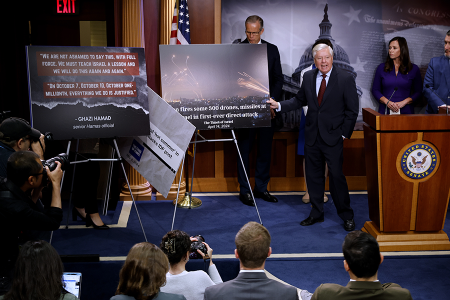"No one can solve this problem alone, but together we can change things for the better."
Talk of Nuclear Use in Gaza Draws Backlash
June 2024
By Libby Flatoff and Shizuka Kuramitsu
A senior U.S. Republican senator appeared to suggest that Israel should consider using nuclear weapons to defeat Hamas in Gaza, drawing criticism from arms control activists and others for normalizing talk of an option that the world has long considered anathema.

During a May 8 hearing at which he faulted the Biden administration for halting the delivery of some weapons to Israel, Sen. Lindsey Graham (R-S.C.) demanded of top U.S. defense officials, “Would you have supported dropping bombs on Hiroshima and Nagasaki during World War II?…Do you think that was disproportionate?”
“You’re going to tell (Israel) how to fight the war when everybody around them wants to kill all the Jews? Give Israel what they need to fight the war. This is Hiroshima and Nagasaki on steroids,” Graham told Defense Secretary Lloyd Austin and Joint Chiefs of Staff Chairman Gen. Charles Brown at a Senate Appropriations subcommittee hearing.
Four days later on NBC, Graham again justified the use of nuclear weapons on Nagasaki and Hiroshima because the weapons were used “to end a war we [could not] afford to lose” and insisted, “Give Israel the bombs they need to end the war they can’t afford to lose.”
Whether Graham actually was advocating the first nuclear weapons use since World War II or not, the comments landed with a thud in Tokyo where Japanese Foreign Minister Yoko Kamikawa described the remarks as “not appropriate” at a May 10 press conference.
She said that Japan “has been expressing for a long time…[that] the use of nuclear weapons does not match the spirit of humanitarianism, which is the ideological foundation of international law, because of their tremendous destructive and lethal power.”
She added that Japan had reiterated this point to U.S. officials.
On May 14, Kamikawa addressed the issue again, telling reporters that “[i]t was very regrettable that such remarks have been made repeatedly.”
The Japan Confederation of A- and H-Bomb Sufferers Organizations, also called Nihon Hidankyo, sent a letter to the U.S. Embassy in Tokyo requesting a retraction of Graham’s remarks, NHK reported on May 15. “The remarks go against international humanitarian law…. [N]ow that the Treaty on the Prohibition of Nuclear Weapons has come into effect, the remarks can only be described as an anachronistic and malicious delusion,” the letter said.
In addition, the mayors of Hiroshima and Nagasaki, in separate press conferences on May 16, condemned Graham’s justification of atomic bombings on their cities, according to Jiji Press.
Graham’s comments “run counter to the direction we should be taking in the future toward our ideals [of a nuclear-free world],” which U.S. President Joe Biden reaffirmed in Hiroshima at the 2023 Group of Seven meeting, Kazumi Matsui, the mayor of Hiroshima, said. (See ACT, June 2023.) “With humanitarian and catastrophic consequences brought about by atomic weapons in mind, nothing can justify the use of nuclear weapons,” Shiro Suzuki, the mayor of Nagasaki, said.
Meanwhile, the International Campaign to Abolish Nuclear Weapons, the 2017 Nobel Peace Prize laureate, wrote on social media May 13 that “likening the situation in Gaza to Hiroshima and Nagasaki [is] utterly unacceptable” and Graham’s statements “shouldn’t be normalized.”
Graham’s remarks garnered the most attention, but other U.S. politicians expressed similar views. Appearing on Newsmax on May 14, Rep. Greg Murphy (R-N.C.) also invoked Hiroshima and Nagasaki and said, “[T]his is where Israel has every single right in the world to press this conflict further.”
Rep. Tim Walberg (R-Mich.) was caught on video at a town hall meeting on March 25 suggesting that the United States should use a nuclear bomb on Gaza to “get it over quick…. [Gaza] should be like Nagasaki and Hiroshima.”
Walberg later denied that he was calling for the use of nuclear weapons, claiming instead that he “used a metaphor to convey the need for both Israel and Ukraine to win their wars as swiftly as possible, without putting American troops in harm’s way.” But Rep. Rashida Tlaib (D-Mich.), the first Palestinian-American member of Congress, criticized Walberg, saying he “is not the first member of Congress to use despicable, violent, dehumanizing language to describe their genocidal intent in Gaza and will not be the last.”
Despite Israel’s long-standing refusal to acknowledge having a nuclear weapons program, Israeli Heritage Minister Amichai Eliyafu said on Radio Kol Barama that using nuclear weapons in Gaza was “one of the possibilities,” the Times of Israel reported on Nov. 5.
Israeli Prime Minister Benjamin Netanyahu denied this possibility and suspended Eliyafu, but Eliyafu in January again “urged that Israel must find ways for Gazans that are more painful than death to defeat them and break their morale, as the [United States] did with Japan,” Middle East Monitor reported on Jan. 6.
